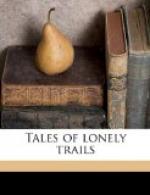That is one of the beautiful things about children, so full of pathos and some strange, stinging joy—they bring back the days that are no more.
This evening, despite my fatigue, I was the last one to stay up. My seat was most comfortable, consisting of thick folds of blankets against a log. How the wind mourned in the trees! How the camp-fire sparkled, glowed red and white! Sometimes it seemed full of blazing opals. Always it held faces. And stories—more stories than I can ever tell! Once I was stirred and inspired by the beautiful effect of the pine trees in outline against the starry sky when the camp-fire blazed up. The color of the foliage seemed indescribably blue-green, something never seen by day. Every line shone bright, graceful, curved, rounded, and all thrown with sharp relief against the sky. How magical, exquisitely delicate and fanciful! The great trunks were soft serrated brown, and the gnarled branches stood out in perfect proportions. All works of art must be copied of nature.
Next morning early, while Romer slept, and the men had just begun to stir, I went apart from the camp out into the woods. All seemed solemn and still and cool, with the aisles of the forest brown and green and gold. I heard an owl, perhaps belated in his nocturnal habit. Then to my surprise I heard wild canaries. They were flying high, and to the south, going to their winter quarters. I wandered around among big, gray rocks and windfalls and clumps of young oak and majestic pines. More than one saucy red squirrel chattered at me.
When I returned to camp my comrades were at breakfast. Romer appeared vastly relieved to see that I had not taken a gun with me.
This morning we got an early start. We rode for hours through a beautiful shady forest, where a fragrant breeze in our faces made riding pleasant. Large oaks and patches of sumach appeared on the rocky slopes. We descended a good deal in this morning’s travel, and the air grew appreciably warmer. The smell of pine was thick and fragrant; the sound of wind was sweet and soughing. Everywhere pine needles dropped, shining in the sunlight like thin slants of rain.
Only once or twice did I see Romer in all these morning hours; then he was out in front with the cowboy Isbel, riding his black pony over all the logs and washes he could find. I could see his feet sticking straight out almost even with his saddle. He did not appear to need stirrups. My fears gradually lessened.
During the afternoon the ride grew hot, and very dusty. We came to a long, open valley where the dust lay several inches deep. It had been an unusually dry summer and fall—a fact that presaged poor luck for our hunting—and the washes and stream-beds were bleached white. We came to two water-holes, tanks the Arizonians called them, and they were vile mud-holes with green scum on the water. The horses drank, but I would have had to be far gone from thirst before I would have slaked mine there. We faced west with the hot sun beating on us and the dust rising in clouds. No wonder that ride was interminably long.




